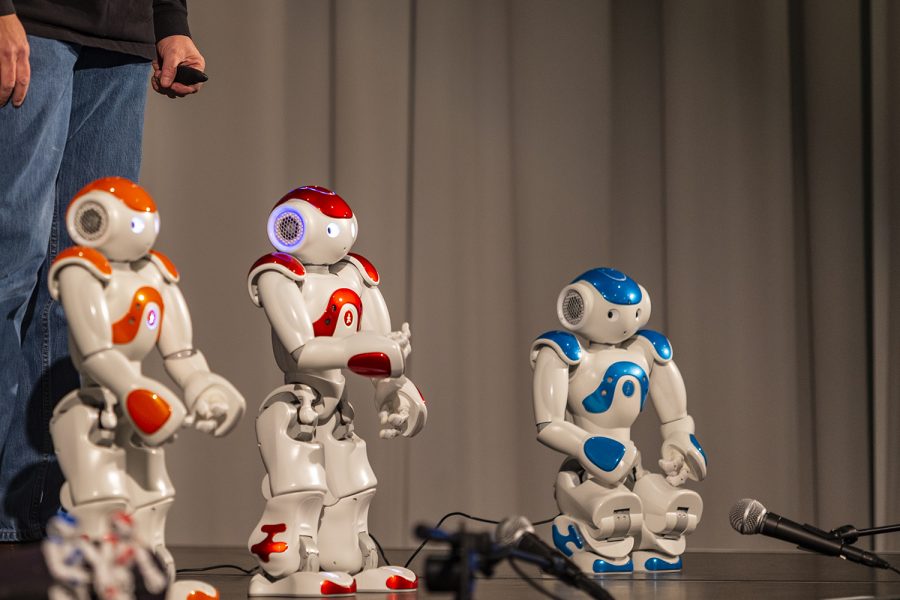Robots take the stage at Hancher Auditorium
Robots took the stage at Hancher Auditorium on Thursday night to explore the future of robots in society and industry.
Robots performed onstage at Hancher Auditorium on Thursday. The performance was put on as part of the University of Iowa Robot Theater Project.
November 14, 2019
Robots took over Hancher Auditorium Thursday evening to perform a series of skits and routines as part of the University of Iowa’s Robot Theater Project.
NAO humanoid robots developed by members of the UI community took to the stage in an effort to explore the integration of robots into our society and economy. The UI Robot Theater Project’s “Robot Theater” is part of the Science on Tap forum at Hancher, creating a space to discover and recognize progress and research in the UI community.
To start the show, two robots called Jackie and Aaron raised their lightsabers and began dueling.
“I am your father,” Aaron yelled as the scene climaxed.
The dueling robots powered down as a new robot rose in the background, introduced as Jesse. Jesse explained that students in computer science classes work together to animate the robots and program their actions.
“I can talk, I can walk, and I can dance,” Jesse said beginning to dance as classical music began to play.
The troupe of robots continued perform scenes from Breaking Bad, comedy sketches, and even magic tricks. At one point, Jesse called an audience member on stage to interact during the magic performance. Jesse proceeded to guess the number the audience member was thinking.
At Thursday night’s event, Denise Szecsei, associate professor of instruction in the computer science department, explained that “Robot Theater” grew out of a class she used to teach called Robot Dancing. Students in the class worked with NAO robots and choreographed and programmed dances, Szecsei explained.
During this course, Szecsei realized that the robots could progress outside of the classroom.
“Theater seemed like a really good place for these robots,” Szecsei said.
The UI Robot Theater Project has grown to provide first-year seminars and summer camps for younger students in the community. Szecsei wanted to emphasize the diversity of opportunities in STEM fields through the project.
“Taking STEM classes isn’t just some boring route to a profession,” Szecsei said. “You can write for robots, program robots, and have them perform.”
Szecsei mentioned that the summer camps made STEM accessible to younger learners. Working with the robots gave the young students confidence in coding and programming.
RELATED:Engineer Your World takes aim at STEM involvement
“They realized that technology can affect anything and that they can do it.” Szcesei said.
Audience member Maggie Gautz explained that theater was not a use for robots that she had ever thought of before.
“[The performance] is not really theater but it is mostly teaching students about STEM,” Gautz said.
Each of the NAO robots used in the project cost around $9,000, Szecsei said. Szecsei explained that a majority of the funding for the project comes from the UI.
“The University of Iowa has been great in supporting this activity,” Szecsei said.
Additional donors to the project include the American Association of University Women and John Deere.
Szecsei explained that she wants to keep growing the project and expanding the scope of the robot performances.
“I would love to work with the Iowa Writers Workshop,” Szcesei said when an audience member asked who she would like to collaborate with.
One key area Szcesei wants to explore is using the robots to tell stories that may be too difficult for humans to tell. She explained that this could be stories of abuse, trauma, or immigration.
Szecsei said that she wants to see how the audience would respond and connect to a narrator without race or gender.
RELATED: Laursen: A call to stop giving robots gender
“We still need human actors and human faces,” Szecsei said. “But for people who don’t want to be in the spotlight, a robot surrogate may be an option.”
Audience members agreed with Szecsei about the usefulness of robots in difficult conversations. UI Faculty Senate President Sandy Daack-Hirsch mentioned the opportunity for robots in the medical field and to start tough conversations.
“You want something that is compassionate and can respond in a humanoid fashion,” Daack-Hirsch said.




